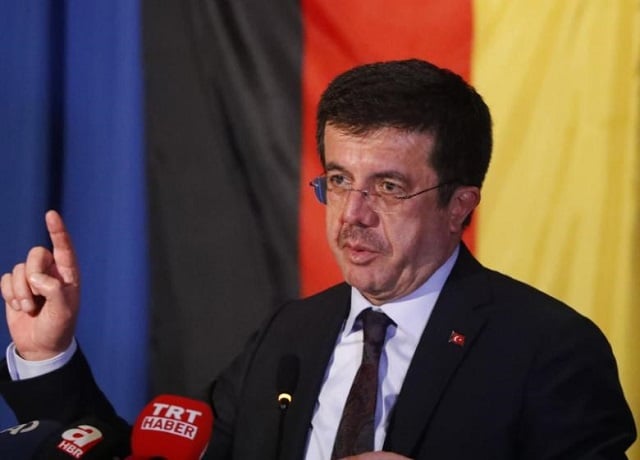
The country is in the throes of the biggest purge in its history against alleged coup supporters while Erdogan has seen his grip on power tightened rather than weakened. But Turkey is also facing some isolation on the diplomatic stage, experiencing tense relations with the European Union and the United States, and now trying to limit the damage from an explosive crisis over its ally Qatar in the Gulf.
Turkey tourism income slumps after attacks, coup
"One year on from the coup bid, President Erdogan is stronger than ever," said Ozgur Unluhisarcikli, Ankara office director of the German Marshall Fund of the United States.
But he added the crackdown has "unavoidably weakened Turkey's international standing particularly vis-a-vis Europe and the United States."
On the night of July 15, 2016, an army faction disgruntled with Erdogan's one-and-a-half decades of domination sought to seize power, closing the bridges in Istanbul, bombing parliament in Ankara and deploying tanks in the streets.
But the coup bid unravelled as Erdogan returned in triumph to Istanbul from holiday and tens of thousands of ordinary Turks poured into the streets to oppose the plotters. Two hundred and forty nine innocent people died in the coup and are regarded as 'sehitler' (martyrs for Islam).
The authorities see the coup bid's defeat as a victory for democracy and have renamed the Bosphorus Bridge in Istanbul that was a centre of the fighting the "Bridge of the 15 of July Martyrs". Extensive commemorations are planned for Saturday including a speech by Erdogan on the bridge, with July 15 now declared an annual holiday, the Democracy and National Unity Day.
Erdogan swiftly said that the coup bid was masterminded by his one time ally turned nemesis, the US-based Islamic preacher Fethullah Gulen who over decades assiduously built up influence in the judiciary, police and the army. From his secluded base in Pennsylvania, Gulen denied the charges. But Erdogan vowed to wipe out the "virus" of Gulen from Turkish institutions.
Turkey subsequently embarked on the most extensive crackdown in its modern history, arresting over 50,000 people and sacking 100,000 more from their jobs.
Critics say the state of emergency imposed last July 20 - which remains in place - has been used to go after all opponents of Erdogan, including critical journalists, activists and pro-Kurdish politicians who opposed the putsch bid.
After landing in Istanbul in one of the turning points of the July 15 coup bid, Erdogan described the attempt as a "blessing from God" and critics have accused him of opportunistically exploiting the events.
On April 16, Erdogan narrowly won a referendum that from 2019 will grant him sweeping new powers and also allow him to resume his leadership of the ruling Justice and Development Party (AKP).
"His control over the AKP is absolute and as a result of the atmosphere of fear created through the post-coup attempt purges, his control over the bureaucracy, private sector and media are tighter than ever," said Unluhisarcikli.
Turkey's modern history has been littered with repeated interventions by the once all-powerful military, including the 1960 coup that led to the execution of then prime minister Adnan Menderes, Erdogan's political hero.
The July 15 bid marked the first time in Turkey's history a military coup had between thwarted and Erdogan rapidly put the military more under his direct control. Around half of all Turkish generals were either arrested or fired after the coup bid.
The coup's defeat even spawned an officially-approved anthem that blares out at Erdogan rallies: "On the night of July 15, the weather was hot/ An attempt of betrayal that burned the heart".
As a NATO member and EU candidate, Turkey lamented the lack of American and European solidarity, with Ankara seeing Brussels as more fixated on the ensuing crackdown than condemning the attempt to oust the democratically-elected government.
Tensions rose between Ankara and Washington over the failure of the US to extradite Gulen, with the new administration of Donald Trump dashing hopes of any shift. By contrast Russian President Vladimir Putin was quick to back Erdogan, helping seal a rapprochement. But in the Gulf, Turkey was last month disturbed by the Saudi-led sanctions slapped on Qatar, its main ally in that region.
Austria has barred Turkish Economy Minister Nihat Zeybekci from entering the country to attend an event marking the anniversary of last year's failed coup in Turkey, a spokesperson for Austria's foreign ministry said on Monday.
The planned event was "very big" and the visit represented a "danger for public order and security in Austria", the spokesperson added. There was no immediate comment from Turkey. The decision follows a similar move by the Netherlands, which said on Friday that Turkish Deputy Prime Minister Tugrul Turkes was not welcome to visit for a ceremony among Turkish expatriates to commemorate the anniversary.
Turkish President Tayyip Erdogan also complained last week that he was not allowed to speak to Turks in Germany during his visit to the country for a G20 leaders' summit, telling a newspaper that Germany was "committing suicide". "I can confirm that (Austrian) Foreign Minister (Sebastian) Kurz has in fact forbidden the Turkish economy minister from entering the country," the spokesperson for Austria's foreign ministry said, repeating comments he made earlier to ORF radio.
Austria has been one of the most vocal critics in the European Union of Turkey's security crackdown since the failed coup last July in which 240 people were killed. Vienna has repeatedly called for Turkey's EU accession talks to be stopped. In the past year Turkey has jailed more than 50,000 people pending trial and suspended or dismissed some 150,000, including soldiers, teachers and civil servants, over alleged links with the exiled Muslim cleric Ankara blames for the coup.
Monday's decision also echoes a dispute in March between Turkey and several countries with large Turkish populations, including the Netherlands and Austria, which blocked pro-Erdogan rallies in the run-up to an April 16 referendum that granted him sweeping new powers.



1732626034-0/BeFunky-collage-(92)1732626034-0-165x106.webp)


1732618327-2/Untitled-design-(7)1732618327-2-270x192.webp)










COMMENTS
Comments are moderated and generally will be posted if they are on-topic and not abusive.
For more information, please see our Comments FAQ